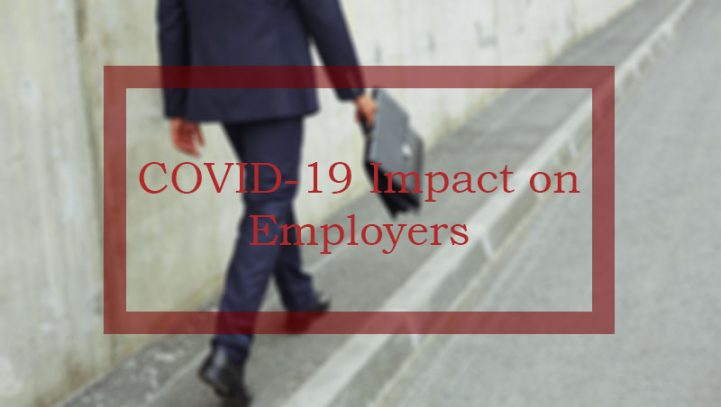COVID-19 Impact on Employers
COVID-19 has become a global pandemic. The outbreak of COVID-19 deadly virus is an unfortunate crisis and the situation we are now facing is unprecedented in history. On 16 March 2020, Prime Minister had announced a Movement Control Order (“MCO”) throughout the country effective March 18 to 31. With the escalating COVID-19 outbreak, the MCO has been extended for another 2 weeks until April 14.
It was reported that the country might see the number of COVID-19 cases increase to over 6,000 by mid-April and the Ministry of Health (MOH) has taken all steps to curb the spread of COVID-19. These are trying and uncertain times. We do not know whether the MCO will be further extended come mid-April 2020.
Only limited commercial premises providing essential services are allowed to open in the interim. Many employers have suffered the brunt of COVID-19 crisis in recent weeks and are experiencing financial constraints during this challenging period. In light of the pressing circumstances, many employers faced with financial adversities might be considering to reduce the heavy overheads would be to downsize the workforce in order to survive and weather the COVID-19 storm.
Below are some of the common questions regarding reduction of workforce by retrenchment and voluntary separation scheme.
Retrenchment
Q: What is retrenchment?
A: Generally, retrenchment is termination of the services of surplus employees.
Q: Can an employer undertake a retrenchment exercise due to outbreak of COVID-19?
A: If an employer suffers financial hardship due to business losses or declining profits or business and is experiencing adverse business condition and reduced productivity or low production as a result of COVID-19 outbreak, the employer may undertake a retrenchment exercise. While it is the prerogative of employer to reorganise its business and decide on the number of employees required, there must be actual redundancy and good faith in retrenchment exercise. A closure of one of the department or business section of an enterprise may be an acceptable justification for reorganisation.
Q: Can an employer arbitrarily select any employee for retrenchment?
A: Generally, an employer shall comply with Last In First Out (LIFO) principles which requires the employer to select the more junior employee in the category of employment for retrenchment. There is also a requirement to retrench all foreign workers first in a capacity similar to that of the local employee.
Q: Can an employer not follow the LIFO principle?
A: Yes but the employer must have sound and valid reasons.
Q: What are the common reasons for not following the LIFO principle?
A: Generally, the employer must show that among others, the alternative selection criteria is fair, objective and reasonable; a more senior employee is incompetent, unreliable and has a record of poor performance; and a more junior employee has special skill or qualification.
Q: Does an employer need to give a notice of termination to the employee?
A: Yes.
Q: How long is the length of notice?
A: For non-unionised employees covered by Employment Act 1955 (“EA”) (namely those workers whose wages do not exceed RM2,000.00 a month or manual labour or such other persons listed in First Schedule of EA), follow EA (summarised below) or such longer notice under contract of employment:
| Period of Employment | Length of Notice |
|---|---|
| Less than 2 years | 4 weeks |
| 2 years or more but less than 5 years | 6 weeks |
| 5 years or more | 8 weeks |
For non-unionised employees not covered under EA, refer to contract of employment.
For unionised employees, refer to collective agreement.
Q: Does an employer need to pay retrenchment benefit to the employee?
A: For non-unionised employees covered by EA, follow EA (summarised below) or such higher amount under contract of employment.
| No. of years of continuous service | No. of days’ wages for each year of employment |
|---|---|
| One year or more but less than 2 years | 10 days’ wages |
| 2 years or more but less than 5 years | 15 days’ wages |
| 5 years or more | 20 days’ wages |
* pro-rata in respect of incomplete year
For non-unionised employees not covered under EA, refer to contract of employment.
For unionised employees, refer to collective agreement.
Q: What should an employer do before undertaking retrenchment?
A: Prior consultation should be made with the employees and trade union (if any).
Q: Does an employer need to notify labour office?
A: Yes. An employer must notify the nearest labour office at least 30 days before undertaking a retrenchment exercise. Need to fill up and submit a prescribed form. Failure to do so is an offence.
Q: What is the consequence of unjustified retrenchment?
A: If there is no justification for a reorganisation or if the retrenchment procedure is unfair, retrenched employees may make a claim of unfair dismissal to industrial court for reinstatement (compel employer to re-engage the employee) or compensation in lieu of reinstatement (usually one month’s salary for every year of service) and back wages (from date of dismissal to the last date of hearing at the industrial court capped at maximum 24 months).
Voluntary Separation Scheme
Q: Under retrenchment exercise, some key employees may have to leave resulting the company losing talent. What alternative does an employer have to get rid of some employees?
A: The employer may implement a Voluntary Separation Scheme (“VSS”).
Q: What is VSS and how does it work?
A: Under VSS, employer will come out with a severance package and then invite employees to participate in the plan on a voluntary basis. Normally, the employer will conduct briefings and issued circulars about the VSS to the employees. Once an employee applies for the VSS, the employer has the discretion to accept or reject the VSS application.
Q: What is the benefit of VSS?
A: VSS will allow the employer to retain the key employee that it requires and therefore reduce the possibility of “talent drain”. VSS will also reduce the risk of being exposed to a claim for unlawful dismissal.
Q: What should an employer do before implementing VSS?
A: Prior consultation should be made with the employees and trade union (if any).
Q: Does an employer need to notify labour office?
A: Yes. An employer must notify the nearest labour office at least 30 days before undertaking a VSS exercise. Need to fill up and submit a prescribed form. Failure to do so is an offence.
Soft Approach to Tackle the Issue
Employee is an appreciating asset of a business entity. The business efficacy and efficiency would very much depend on the performance of employees. Retrenchment should be the last resort. If the company is facing losses and is trying to fight off closure of its business or retrenchment of its employees, the company can appeal to the employees to ride though the rough times with it and takes a salary cut which then be reinstated and increased when the business picks up again. Such measure will not only increase the chances of retaining key employees in the long run but also maintain the morale and confidence of the employees.
Covid-19 Employment/Contractual Disputes. Please click HERE
Email: Covid19@LowPartners.com
Covid-19 Legal Hotline: 017 – 490 5293
This article is written by our Partner, Wai Chong Khuan
Related Articles
Federal Court’s Reinstatement Order Reignites Debate on Fixed-Term Employment : A case study on Ooi Mei Chien v. Osram Opto Semiconductors Sdn Bhd & Ahmad Zahri bin Mirza Abdul Hamid v AIMS Cyberjaya Sdn Bhd [2020] 5 MLJ 58
In a bold and precedent-reaffirming decision on 17 June 2025 for the case of Ooi Mei Chien v. Osram Opto Semiconductors Sdn Bhd, the Federal Court of Malaysia ordered the reinstatement of a former senior...Unfair Dismissal: What Are Your Rights as a Workman in Malaysia?
If you have been unfairly dismissed by your employer, you have the right to file a representation under Section 20(1) of the Industrial Relations Act 1967 (IRA) for reinstatement to your former employment. This is...Probationary Employment in Malaysia: An In-Depth Guide
In Malaysia, probationary periods are a standard practice in employment, serving as a trial phase for employers to evaluate new hires before offering permanent positions. This period is critical for assessing skills, behavior, and organizational...Domestic Inquiries: Best practices
1. What is a domestic inquiry? 1.1 A domestic inquiry is an internal disciplinary proceeding conducted by an employer to make a finding as to whether a given employee has committed an act (or acts,...Can Employer not Pay Employees for Overtime?
Due to the recent amendment of the Employment Act 1955 (“the Act”), there is an increasing concern among the employers regarding the payment of overtime. The employers are piled with the pressure to pay employees...Updates on Industrial Relations Act 1967
The Industrial Relations (Amendment) Act 2020 have made significant amendments to the Industrial Relations Act 1967, one of which is the deletion of section 33A of the Act and the introduction of section 33C to...Whether The Special Holiday in State Level is Compulsory
Entitlement Holiday by An Employee the National Day; the Birthday of the Yang di-Pertuan Agong; the Birthday of the Ruler of the State or Yang-di-Pertua Negeri or Federal Territory in which the employee wholly or...
Contracts in Restraint of Trade in Malaysia
Restraint of Trade in Employment Contracts: Understanding What it is and How it Impacts Employers & Employees Introduction On 29th of May 2021, Malaysia has reported a daily record of 9,020 new Covid-19 cases, its...
Pemecatan Terancang
DEFINISI Secara amnya, pemecatan terancang (Constructive Dismissal) bermaksud perbuataan seseorang pekerja dalam menamatkan pekerjaannya disebabkan oleh pelanggaran oleh majikan pada perjanjian pekerjaan. Pelanggaran tersebut harus membentuk satu pelanggaran yang kritikal sehingga ianya mampu mengubah syarat-syarat...
COVID-19 Impact on Employers
COVID-19 has become a global pandemic. The outbreak of COVID-19 deadly virus is an unfortunate crisis and the situation we are now facing is unprecedented in history. On 16 March 2020, Prime Minister had announced...
Contract Performance in COVID-19: Force Majeure and Frustration
View CN Version The 28 days lockdown period is only temporary. Serious commercial consequences will follow after this period. Businesses will be facing uphill challenges in fulfilling their contractual duties in a normal way due...
行动管制令期间无法营业,公司可否借此为由终止或延长合约
View EN Version 在covid-19心冠肺炎疫情的肆虐下,为了抗疫,我国在三月十八日进入了为期二十八天的行动管制期。在这期间除了特定“重要”领域或行业可以继续运营(受限于对该领域或行业的限制), 所有政府与私人机构必须关闭休业。 抗疫当前,管制令无疑是目前防疫的最佳措施,但这也让很多中小企业正面临严峻的财务危机。在行动管制期间许多中小企业因无法营业而导致无法履行合约的条款或义务,可能因此而面临因违约而被起诉的危机。 那公司可不可以以行动管制令强制停止营业为由,单方面终止或延长合约时间?这就视乎双方可有书面合约(written contract)且合约内容。 1. 书面合约是否有不可抗力 (force majeure) 条款 不可抗力是指一些不能预见,不能避免,不可控制的意外事故。不可抗力条款是一种免责(disclaimer)条款。这条款是规定合约后若须履行职责的一方(当事人),因为不可抗力而不能履行或不能如期履行合约的全部或部分义务,可免除其全部或部分义务或允许延长履行合约时间。 2. 不可抗力条款是否足以概括因covid-19而发生的行动管制令 不可抗力的事故主要包括两种情况,一种是由于自然力量引起的,如水灾、风灾、旱灾、地震等;另一种是社会原因引起的,如战争、封锁、政府禁令等。当事人可不可以利用不可抗力条款,就必须视乎合约内的不可抗力条款是否有概括因疾病而不可控制的情况如行动管制令或封城。 3. 若其条款不足以涵盖covid-19的管制令 若不可抗力条款没有概括因疾病而导致不可控制的事故,如管制令先别慌张,因为合约必须是整体性的。所以法庭在判断此不可抗力条款是否足够概括因covid-19而发生的行动管制令时,也会衡量其他合约的条款和合约的业务性质与业务风险等。 4. 若无不可抗力条款或没有书面合约 那如果合约内没有不可抗力条款或双方并没有书面合约,是否就意味着当事人就完蛋了,必须赔钱了。这也并不一定。法律还是有人性的。 当事人可以提出合约因为管制令的关系无法履行而被迫终止。如同第3段所述,法庭会判断业务性质,因管制令而被迫强制停工或管制令后复工所导致的问题等,合约是否真的已无法进行而被迫终止。 由于因疫情的肆虐而导致行动管制令在我国并没有先例,所以目前并没有案例及确切的情况。以上所述可供指引,若需要深入的法律咨询请填写一下表格,电邮:Covid19@LowPartners.com或拨电至017-490 5293与我们联系。 Covid-19 Legal Help 本文是由我们律师楼的合伙人撰写,卓莉琴律师 Toh Lee Khim Partner, Low...
Right to Vote in Malaysia: Can My Employer Refuse to Approve My Leave?
The 14th General Election (“GE14”) is before us. However, the Election Commission has fixed the polling to be held on 9th May 2018, a Wednesday. At the time of writing, there is no indication from the caretaker...

